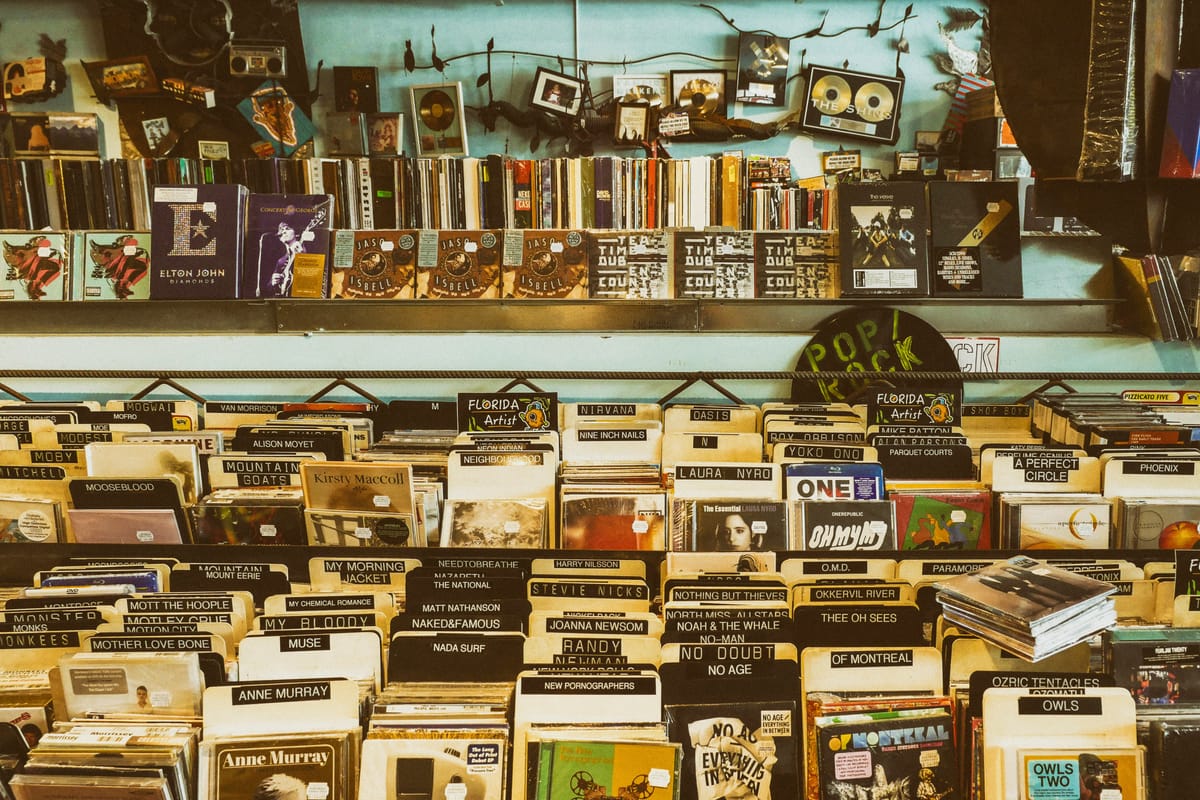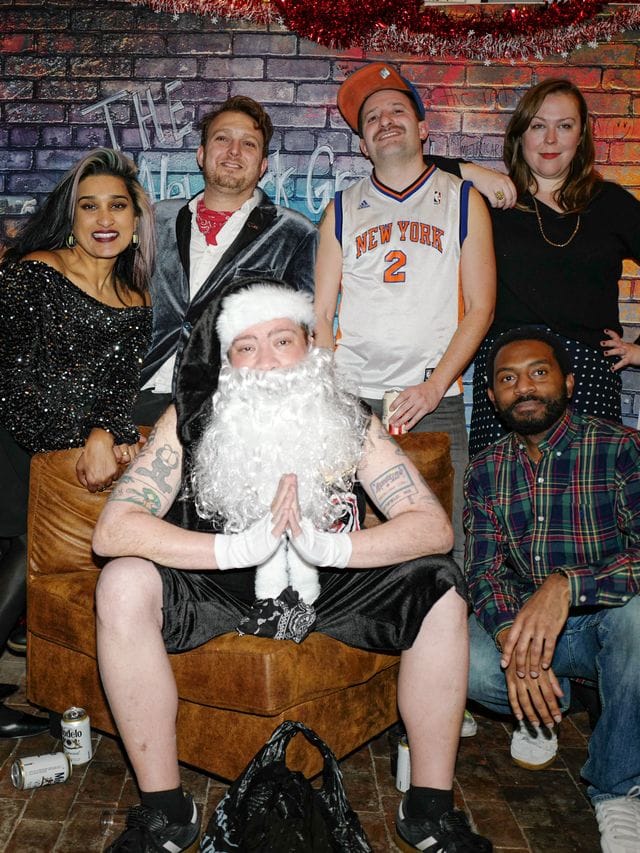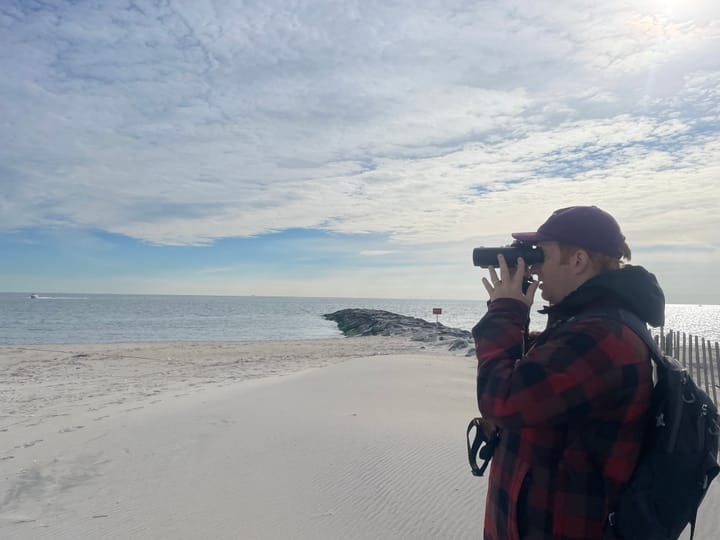How to find new music without an algorithm
It's time we stopped ceding the discovery process to the bots

As part of the ongoing quest to claw my life back from the bots, I’ve got a new resolution: I want to get my music recommendations from actual humans, and actual humans only.
If I’m being honest, I’ve been pretty smug about the whole AI thing lately — no, I don’t feel the need to torch the environment just to use a fancy version of Google, do an admin task that would take me five minutes, or get a worse version of human creative output, thanks. But I’ve also realized with no small level of horror that for years now, I’ve been almost entirely outsourcing the joyfully human work of finding new (or new-to-me) music to the algorithm, and finding a narrower and less gratifying range of options as a result, no surprise.
There was a time when I was pretty good at and actively enjoyed the process of digging around for new discoveries — taping songs off the radio and checking CDs out from the library to add to mixtapes as a kid, scouring MP3 blogs in their 2010s heyday — but in the “Discover Weekly” era, my skills have atrophied, in favor of a platform that not only flattens my options, but is famously horrible for the actual artists.
I decided I needed advice from an expert source, which in this case obviously means Hearing Things, the worker-owned “music and culture platform” that was launched last October by a team of former Pitchfork writers (and has the distinction of having turned team Groove onto the joys of Dummy, among many other things).
Last week, I caught up with Hearing Things co-founder Andy Cush, who, it turns out, quit Spotify himself earlier this year along with Apple and any other on-demand streaming services.
“Even when I was still using streaming, I was trying to be on top of music in a different way than just letting the Spotify algorithm recommend stuff to me,” he said.
Below, some of Andy’s best advice for finding music like a person — and better supporting artists, while we’re at it. And after that, I’ll get into some of my own better tips and discoveries that have come up thus far in my journey away from the algorithm.
Get out to shows, talk to your friends
Let’s start off strong with some simple but potent “get off the internet” advice.
“A lot of new music that I find is talking to friends who really care about music and learning what they’re excited about,” Cush told The Groove. “I also go out and see live music three nights a week or so, and often that means encountering someone else on the bill who I haven’t heard of.”
Breaking the streaming habit
Having committed to getting himself off of streaming platforms (e.g. Spotify and Apple Music), Cush does a lot of discovery via Bandcamp, a more artist- and album-centered platform, but is also looking to rewire the expectation of having every album in existence available to listen to at all times.
“I spend a fair amount of time clicking around the Bandcamp interface, where you can be like ‘What’s an electronic music album released in the last week that sold a lot of copies,’” he said. “If you decide to become engaged with buying music on Bandcamp or make that a normal part of your music listening diet, the more you interact with it, artists will send you an alert when they have a new thing out, or suddenly you’re on a label’s mailing list getting updates about new releases from artists you didn’t know about.”
This does involve a certain amount of commitment to spending money, both in the form of purchasing physical media, like records, or buying digital downloads of albums.
“I never used to do that even though as a musician I’m aware of how much more meaningful that is to a musician than if you stream a hundred times on Spotify,” he said. “I’m trying to be the change I’d like to see in the world as a musician.”
Know your label
About those new release emails from labels — if you find a current artist you’re into, make a point of finding out who their label is, and getting on their mailing list.
“I think it’s a lot of fun and a very reliable way to find new music, if you decide to sort of follow a record label and think of yourself as a fan of that label as well as artists on it,” Cush said. “If you noticed these two artists came out recently on the same label, there’s a good chance the person who's picking releases for that label aligns with your taste.”
It can also be a kind of shorthand; last year when a friend in Seattle told me I should go see The Bug Club when they played in New York, he made sure to mention that they’d just signed to Sub Pop as an extra selling point (I went and it ruled, go see them).
The process also winds up being gratifying beyond the actual music you might come across.
“It almost feels like following a sports team, like you’re really rooting for this label,” he added. “There’s a certain excitement that I start feeling about music where it’s like ‘Oh I’ve never heard of this artist who just signed,’ and it gives you a sense of narrative which the Spotify algorithm really deprives music of.”
It’s been my experience that a similar thing is true for venues — for me, TV Eye in Ridgewood is a prime example. If you go to a show you like, get on that venue’s email list and keep an eye on what they have coming up (or just roll the dice on a random show). Chances are, if you like one or two things they’ve put on recently, you’ll find a lot of other good stuff there, too.
Embrace the radio — and music writing
Let’s take a moment for the grandaddy medium of “humans picking out music for you.”
“I listen to the radio a lot, and New York has a few really great independent radio stations who are going to be playing stuff you don’t encounter other places,” Cush said. WFMU, a Jersey-based freeform station, is nationally beloved and a perennial staple, and Cush also mentions WKCR, the jazz-focused Columbia University station, “Which I feel like I have to clarify is financially independent from the university and has not capitulated to the Trump administration in any way.”
You can find a starter pack of independent New York-area radio stations here, and you’d better believe the good people of reddit have thoughts on the topic as well.
“It’s nice knowing that there’s a DJ on the other side of the transmission who’s kind of lovingly picking songs for you, who’s invested in the music and sharing really helpful information about it when they get on the mic,” he added.
Beyond the radio, Cush recommends writing from Aquarium Drunkard, and Futurism Restated, a substack of overflow writing and recommendations from Pitchfork contributing editor Philip Sherburne.
“These different ways of finding music can interact,” Cush added. “‘I heard them on the radio, turns out they’re also signed to this label I liked.’”
Just talk to the record store clerk
Stereotypes of surly or snobbish record store employees notwithstanding, they’re actually more often a friendly font of wisdom.
“I find the cliches of the clerk who’s an asshole and doesn’t want to help you mostly not true in this day and age,” Cush said. “Most of the music that’s new to me that I find — I have to shout out my local store Record City, but there are so many others. Talking to the clerk and just picking stuff that looks cool, or you recognize the label. To me that’s one of the greatest experiences as a fan of music.”
As for my own process, I’m in the middle of switching from Spotify over to Apple Music, because if I’m not quite ready to kick the on-demand streaming habit yet, I might as well be doing it on a platform with famously superior sound quality and notably better payouts for artists.
I’ve also been diving headfirst into the world of radio, both regular and satellite. Hot tip: SiriusXM will give you a three-month free trial, and aside from baseline vibe stations (‘90s on 9, Smokey’s Soul Town, etc.) has some more specifically human-curated show options, notably Brooklyn Vegan’s recurring show. There’s also SiriusXMU Old School, which I found when former Best Coast frontwoman Bethany Cosentino, who I still follow on Instagram (and whose solo album from a couple summers back deserves far more attention), recently guest-hosted and posted about it. (That’s that human synergy we’re talking about right there, even if it did involve a social media app.)
Instead of occasionally remembering to stream radio stations I like from a clunky browser — or downloading individual apps for each station — I’m experimenting with finding the best all-purpose radio app to keep ‘em all in one place. (Right now I’m doing that via Apple’s built-in radio app, which I find to be glitchy and ad-filled, so I’m going to do some digging on other options.) Being able to easily toggle between options all over the country — WFMU, KPISS, KEXP, The Current, and even my college radio station — is a game changer.
Sometimes I’ve been known to follow radio shows to other platforms if called for; I still subscribe to the mixcloud account of LAFOS (the Lost and Found Oldies show), which I heard once upstate on Vassar’s radio station WVKR, and whose host has credible evidence he’s Bobby Darin’s illegitimate son. The host banter is like nothing any large language model could ever dream up, and more to the point, the music unfailingly hits.
Let’s also take a last moment for the power of mixes. A few years back, the Times chronicled the discovery of a trove of vintage DJ set tapes on Fire Island, which are still being archived and uploaded online as the Pine Walk Collection, and still reliably perfect to put on if it’s hot out and you’re hosting. A dance party called How Does It Feel to Be Loved that my friends took me to in London approximately 1 trillion years ago (it was 2007) is somehow still around, and putting out mixes from their monthly dance parties. I have yet to put one on in the background and not have friends ask what it is and where I found it.
The point is, if you hear something you like, taking an extra second to find the source and bookmark it is almost always worth it, and something I’m excited to find my way back to. What feels better: knowing that a bot is harvesting and monetizing your data, or that some thoughtful person out there just wants you to have as good a time as possible dancing with your friends?




Comments ()